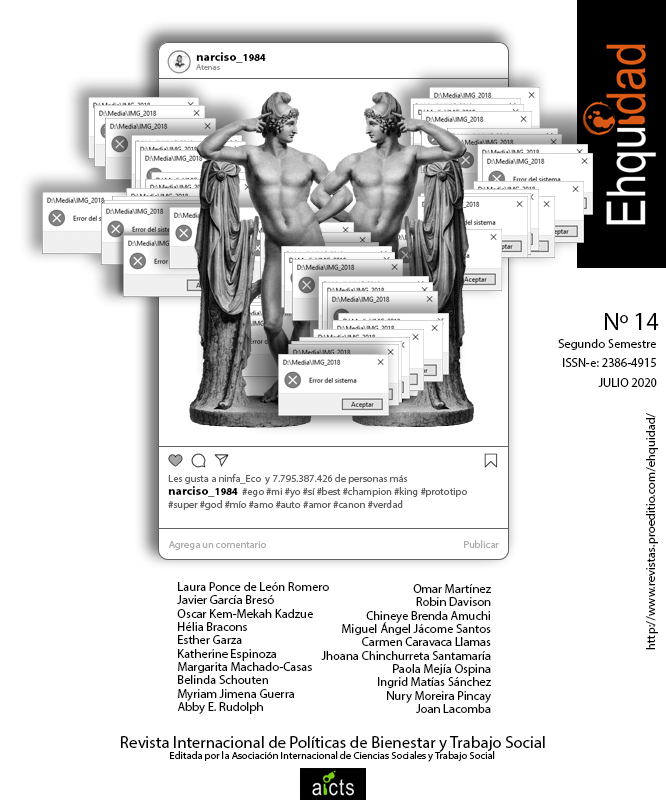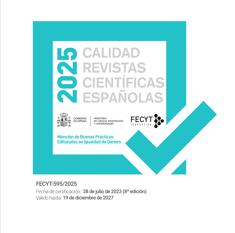Highly Effective Practices of Three Bilingual Teacher Preparation Programs in US Hispanic-Serving Institutions (HSIs)
DOI:
https://doi.org/10.15257/ehquidad.2020.0014Keywords:
: bilingual pre-service teachers, BPSTs, bilingual teacher preparation, identity formation of BPSTs, socioemotional processes for bilingual teacher preparation, bilingual teacher retention and recruitment, Hispanic Service Institutions (HSIs), bilingual teacher shortageAbstract
Bilingual teacher preparation programs are opportunities for aspiring teachers or Bilingual Pre-Service Teachers (BPSTs) who have linguistic proficiency and cultural knowledge in two languages that are seen as assets to address the needs for bilingual and multilingual populations in the US. However, there is an evident shortage that has been documented to attest to the high need of hiring bilingual and dual language educators (USDE, 2015). In this article, three bilingual teacher preparation programs housed in Hispanic Serving Institutions (HSIs) explore their practices and present highly effective examples for bilingual and dual language teacher preparation. The findings include the process of bilingual teacher identity formation that calls for critical consciousness that includes an awareness of the sociopolitical and sociocultural connections for learning. Other significant findings include support for highly effective pedagogical practices and attention to the socioemotional process that leads to advocacy and agency resulting in a social justice orientation and perspective. A cyclical model is presented as a framework for successful bilingual teacher preparation and the implications provide a future direction in exploring the cyclical model as a recruitment and retention strategy for successful bilingual teacher preparation.
Downloads
References
Alfaro, C. (2017). Growing ideologically clear and linguistically efficacious dual language
teachers. California Association for Bilingual Educators (CABE). The multilingual
educator: Conference Edition, 36–42.
Alfaro, C. (2018). The sociopolitical struggle and promise of bilingual teacher education: Past,
present, and future. Bilingual Research Journal, 41(4), 413–427.
Alfaro, C., & Bartolomé, L. (2018). Preparing Ideologically Clear Bilingual Teachers:
Honoring Working-Class Non-Standard Language Use in the Bilingual Education
Classroom. Issues in Teacher Education, 26(2), 11-34.
Alfaro, C., & Hernández, A. M. (2016). Ideology, pedagogy, access and equity (IPAE): A critical examination for DL educators. The Multilingual Educator, 3(1), 8–11.
Amanti, C. (2019) The (invisible) work of Dual Language Bilingual Education teachers.
Bilingual Research Journal, 42(4), 455-470.
Anzaldúa, G. (1999). Borderlands: La frontera. San Francisco: Aunt Lute Books
Arce, J. (2004) Latino bilingual teachers: the struggle to sustain an emancipatory pedagogy in
public schools. International Journal of Qualitative Studies in Education, 17(2),
-246.
Arroyo-Romano, J. (2016). Bilingual education candidates’ challenges meeting the Spanish
language/bilingual certification exam and the impact on teacher shortages in the State
of Texas. Journal of Latinos & Education 15(4), 275-286.
Baker, C., & Wright, W.E. (2017). Foundations of Bilingual Education and Bilingualism (6th
edition). Bristol: Multilingual Matters.
Bartolomé, L. I. (2004). Critical pedagogy and teacher education: Radicalizing prospective
teachers. Teacher education quarterly, 31(1), 97-122.
Bartolomé, L. I., & Trueba, E. T. (2000). Beyond the politics of schools and the rhetoric of
fashionable pedagogies: The significance of teacher ideology. Immigrant voices: In
search of educational equity, 277-292.
Blanton, C. (2004). The strange career of bilingual education in Texas, 1836-1981. College
Station: Texas A & M University Press.
Calderon, D. (2014). Anticolonial methodologies in education: Embodying land and indigeneity
in Chicana feminisms. Journal of Latino/Latin American Studies, 6(2), 81–96.
Carver-Thomas & Darling-Hammond, L. (2017). Teacher turnover: Why it matters and what we
can do about it. Palo Alto, CA: Learning Policy Institute
Cervantes-Soon, C. G. (2018). Using a Xicana feminist framework in bilingual teacher
preparation: Toward an anticolonial path. Urban Review, 50(5), 857-888.
Delgado Bernal, D. (2002). Critical race theory, Latino critical theory, and critical
raced-gendered epistemologies: Recognizing students of color as holders and creators of
knowledge. Qualitative Inquiry, 8(1), 105-126.
Emmerson, R., & Fritz, R. RR, & Shaw, L.(1995). Writing ethnographic field notes.
Flores, B. B., Clark, E. R., Guerra, N. S., & Sánchez, S. V. (2008). Acculturation among Latino
bilingual education teacher candidates: Implications for teacher preparation institutions.
Journal of Latinos and Education, 7(4), 288-304.
Flores, B.B. & Claeys, L. 2010. Academy for teacher excellence: Maximizing synergy among
partners for promoting college access for Latino teacher candidates. The Urban Review,
(3).
Freire, P. (2000). Pedagogy of the oppressed. 30th anniversary ed. New York: Continuum.
Freire, P. (1972). Pedagogy of the oppressed. New York: Herder and Herder.
García-Mateus, S. & Palmer, D. (2017) Translanguaging pedagogies for positive identities in
two-way dual language bilingual education. Journal of Language, Identity &
Education, 16(4), 245-255.
García , O. & Wei, L. (2014). Translanguaging: Language, bilingualism and education. New York: Palgrave Macmillan.
González, R.D., & Melis, I. (eds.). (2000). Language ideologies: Critical perspectives on the
official English movement, Vol. 1: Education and the social implications of official
language. Urbana, IL and Mahwah, NJ: National Council of Teachers of English and
Lawrence Erlbaum.
Hakuta, K. (1990). Bilingualism and bilingual education: A research perspective. Occasional
Papers Series, No. 1. Washington, DC: National Clearinghouse for Bilingual Education.
Hispanic Association of Colleges and Universities. (n.d.). The Champions of Hispanic Success
in Higher Education. https://www.hacu.net/hacu/default.asp
Kennedy, B. (2018) The bilingual teacher shortage in one Texas school district:
Practitioner perspectives, Journal of Latinos and Education.
Lave, J., & Wenger, E. (1991). Situated learning. Legitimate peripheral participation. Cambridge: University of Cambridge Press.
Lopez, A. E. (2011). Culturally relevant pedagogy and critical literacy in diverse English
classrooms: A case study of a secondary English teacher's activism and agency. English
Teaching: Practice and Critique, 10(4), 75-93.
Machado-Casas, M., Cabello, S. A., Talati-Espinza, K., & Abdul-Razaq, H. (2018). Working
with immigrant and refugee families: broadening cross-cultural understanding with
immigrant/refugee families. Foro de Educación, 16(25), 193-205.
Machado-Casas, M., Talati, K., Abdul-Razaq, H., Fonseca, M., & Peña, C. (2017). Pedagogies of
Puppetry: Marginalization, hegemony and colonized treatment of Immigrant and Refugee
Families. EHQUIDAD. Revista Internacional de Políticas de Bienestar y Trabajo Social,
(7), 11-42.
Machado-Casas & Espinoza, K. (2020). Programmatic Clarity: A Framework for Bilingual
Teacher Preparation. Manuscript submitted for publication.
Machado-Casas, M. & Castillo, G. (2019, Feb.). Online Bilingual Credential Programs: A
Framework for Instruction, Engagement, and Pedagogy. National Association of Bilingual Education Conference, Orlando, FL.
Machado-Casas, M. & Schouten, B. (2012, Feb. 15). Bilingual Education Student Organization
(BESO): A Model for Growing Our Own Conscious Educators. Manuscript submitted for publication.
Machado-Casas, M. & Schouten, B. (2012, Feb. 15). Current language policies and the changing
face of the U.S. National Association of Bilingual Education Conference, Dallas, TX.
Martínez-Álvarez, P., Cuevas, I., & Torres-Guzmán, M. (2017). Preparing Bilingual Teachers:
Mediating Belonging With Multimodal Explorations in Language, Identity, and Culture.
Journal of Teacher Education, 68(2), 155–178.
Maxwell, J. A. (2008). Designing a qualitative study. The SAGE handbook of applied social
research methods, 2, 214-253.
Merriam, S. B. (2009). Qualitative research: A guide to design and implementation. San
Francisco, CA: Jossey-Bass
Moll, L. & Amanti, C. (2005). Funds of knowledge: Theorizing practice in households,
communities, and classrooms. Mahwah, N.J: L. Erlbaum Associates.
Montaño, T., López-Torres, L., DeLissovoy, N., Pacheco, M., & Stillman, J. (2002). Teachers as
activists: Teacher development and alternate sites of learning. Equity & Excellence in
Education, 35(3), 265-275.
Morgan, B. (2004). Teacher identity as pedagogy: Towards a field-internal conceptualisation in
bilingual and second language education. International Journal of Bilingual Education
and Bilingualism, 7(2-3), 172-188.
National Center For Education Statistics. (2019, April 14). English language learners in public schools. IES-NCES. http://nces.ed.gov/pubs2005/2005003.pdf
Nieto, S. & Bode, P. (2012). Affirming diversity: The sociopolitical context of multicultural
education. Boston, MA: Pearson Education,
Our Lady of the Lake University. (2020). History. https://www.ollusa.edu/about/history.html
Padilla, A.M., Lindholm, K. J., Chen, A., Duran, R., Hakuta, K., Lambert, W. and Tucker, R.G. (1991). The English-only movement: Myths, reality, and implications for psychology.
American Psychologist 46, 120–130.
Picower, B. (2012). Teacher activism: Enacting a vision for social justice. Equity & Excellence in Education, 45(4), 561-574.
Schouten, B. & Machado-Casas, M. (2015, Mar. 7). Increasing the bilingual pipeline. National
Association of Bilingual Education Conference, Las Vegas, NV.
Urrieta, L. (2009). Working from within: Chicana and Chicano activist educators in
Whitestream schools. University of Arizona Press.
Urrieta, L. (2010). Working from within: Chicana and Chicano activist educators in whitestream
schools. University of Arizona Press.
U.S. Bureau of Higher Education. (1968). Search 68: educational talent search program,
-69. U.S. Government Printing Office.
U.S. Department of Education. (2015). Office of English Language Acquisition, Dual Language
Education Programs: Current State Policies and Practices, Washington, D.C.
Valenzuela, A. (2016). Growing critically conscious teachers: A social justice curriculum for
educators of Latino/a youth. New York, NY: Teachers College Press.
Varghese, M., Morgan, B., Johnston, B., & Johnson, K. A. (2005). Theorizing language teacher
identity: Three perspectives and beyond. Journal of language, Identity, and Education,
(1), 21-44.












